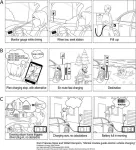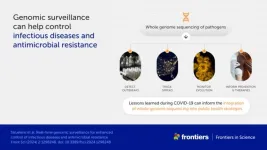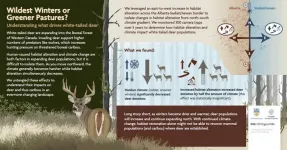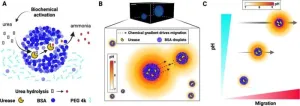(Press-News.org) A new study published in the journal Animal-Human Interactions reveals that emotional turmoil experienced by dog owners after their pet has been stolen is like that of losing a loved one such as a caregiver losing their child.
The findings empirically support the notions that the ‘owner’ or guardian roles and relationships equate to familial relationships and, when faced with the theft of their pet, owners feel a similar sense of disenfranchised grief and ambiguous loss.
In the study, some participants felt the loss was more intense than the death of a friend or relative owing to the closeness of the human-animal bond they had with their pet that in some cases, they did not have with some family members.
Akaanksha Venkatramanan and Dr Lindsey Roberts suggest sadness/sorrow, despair and hopelessness, and emotional pain and/or numbness, coupled with anxiety was consistently reported in the study; the same emotional reactions evident at the death of human loved ones but that the emotions were distinct owing to the difference in how society views the death of people versus our beloved companion animals or ‘pets.’
The psychological distress experienced was often made worse by a lack of understanding of how much an animal companion can mean to someone, and that dog theft laws often only consider dogs as stolen property in the same way as having a material possession such as bicycle stolen, because of this the Police are limited in the support they can offer too.
The situation can be made worse by the manner the dog was stolen too – either through physical force or entering someone’s own home or property without consent.
The researchers say that given the evidence of similar grief and coping markers to the loss of loved ones and children, dog owners are susceptible to developing challenges and delays processing their grief such as Post Traumatic Stress Disorder and Post Grief Disorder, as there is a real risk of having no closure from the event, particularly if the dog is never returned home or found deceased.
The researchers said the study also demonstrates that dog owners cope just as they would when missing a human family member has gone missing or passed but propose social media as a way of continuing the search for their pet, adapting to the new situation by reaching out to those in a similar situation, retaining hope, and/or attempting to cope with their grief and adjust to new circumstances without their dog.
Psychological research, the researchers say, should aim to inform best-practice resources providing suitable help managing grief, social disenfranchisement, and other psychological or physiological consequences of this trauma.
Ms Venkatramanan, an Assistant Psychologist, Berkshire Healthcare NHS Foundation Trust, said, “This study explored the experiences and needs of dog-guardians when faced with dog theft and the results validated an overlap of characteristics between human and non-human relationships.
“It provides evidence of the intense love of dogs and the parental accountability of guardians. A consequent overlap of emotional distress at the loss of this relationship is also shown, providing empirical evidence to formulate psychological and legal support to this, currently disenfranchised, grief experience.”
In the UK alone, there are 13 million dog owners. Having a pet has been found to improve physiological and psychological wellbeing – correlating to reduced cardiovascular mortality, depression, and stress levels. Dogs are a source of comfort to many, particularly for those who without them, would experience significant loneliness.
The researchers highlight how having a dog buffered against the negative impact of loneliness experienced during the COVID-19 lockdowns in the UK as dogs give people a reason to leave the house for walks, exercise and spend time in nature.
Sadly, the upshot of many more people raising dogs in this time resulted in a spike in breeding, a rise in the cost of puppies for sale and theft during the pandemic. While 3.2 million pets were bought during lockdown, there were also over 2,000 reports of dogs stolen – a rise in dog theft by 250% pre-Covid.
Dr Roberts, human-animal bond expert and Senior Lecturer at the University of the West of England, (UWE), said, “This research was launched when my friends’ dog, Lola, was stolen from under her nose in her back garden by someone we presume was posing as a delivery driver. The distress rocked everyone, and I felt more had to be done to support those who were having their dogs stolen.
“We interviewed people who had experienced theft, and we have since developed a questionnaire that aims to highlight the areas people need most support in coping with the theft of their dogs to help alleviate suffering.”
Dr Roberts reports that more research in this area is already underway to support people. She said, “Our next study has been completed to test the first ‘Dog Theft Impact Scale (DTIS)’ and we hope it will be published too so we can launch our questionnaire as a support tool for anyone affected by the devasting effects of dog theft. We will continue to work with Dog Lost and the Pet Loss service offered by the Blue Cross to support those who need help after this crime.”
She adds that, “We are already working with Dr Dan Allen at Keele University, who has carried out extensive work exploring how animals are more-than-property and has advocated for pet theft reform (www.pettheftreform.com).”
Collectively, this work and further research could contribute towards a significant policy change in law enforcement protocols to make it consistently supportive for the victims by introducing harsher penal codes for people who steal companion animals to deter criminals and help stamp out the prevalence altogether.
Anyone affected by dog theft or bereavement can contact their teams for direct support here: https://www.doglost.co.uk/ or https://www.bluecross.org.uk/pet-bereavement-and-pet-loss
Additional information
Main image: (Credit: Pixabay).
Full paper reference
Venkatramanan, Akaanksha; Roberts, Lindsey, ‘The experiences and needs of dog owners affected by dog theft,’ Human-Animal Interactions, 25 April (2024). DOI: 10.1079/HAI.2024.0004
The paper can be read open access from 13:00hrs UK time 25 April 2024, here: https://www.cabidigitallibrary.org/doi/10.1079/hai.2024.0004
Media enquiries
For more information and an advance copy of the paper contact:
Akaanksha Venkatramanan, Assistant Psychologist, Berkshire Healthcare NHS Foundation Trust – email: akaanksha.venkatr@gmail.com
Dr Lindsey Roberts, Senior Lecturer, University West of England, Bristol - email: Lindsey.Roberts@uwe.ac.uk
Wayne Coles, Senior PR Manager, CABI – email: w.coles@cabi.org
About Human—Animal Interactions
Human—Animal Interactions is an open access interdisciplinary journal devoted to the dissemination of research in all fields related to interactions between non-human animals and their human counterparts.
About CABI
CABI is an international not-for-profit organization that improves people’s lives by providing information and applying scientific expertise to solve problems in agriculture and the environment.
Through knowledge sharing and science, CABI helps address issues of global concern such as improving global food security and safeguarding the environment. We do this by helping farmers grow more and lose less of what they produce, combating threats to agriculture and the environment from pests and diseases, protecting biodiversity from invasive species, and improving access to agricultural and environmental scientific knowledge. Our 49-member countries guide and influence our core areas of work, which include development and research projects, scientific publishing, and microbial services.
We gratefully acknowledge the core financial support from our member countries (and lead agencies) including the United Kingdom (Foreign, Commonwealth and Development Office), China (Chinese Ministry of Agriculture and Rural Affairs), Australia (Australian Centre for International Agricultural Research), Canada (Agriculture and Agri-Food Canada), Netherlands (Directorate-General for International Cooperation, and Switzerland (Swiss Agency for Development and Cooperation). Other sources of funding include programme/project funding from development agencies, the fees paid by our member countries and profits from our publishing activities which enable CABI to support rural development and scientific research around the world.
END
Study reveals emotional turmoil experienced after dog-theft is like that of a caregiver losing a child
A new study published in the journal Animal-Human Interactions reveals that emotional turmoil experienced by dog owners after their pet has been stolen is like that of losing a loved one such as a caregiver losing their child.
2024-04-25
ELSE PRESS RELEASES FROM THIS DATE:
PhRMA Foundation awards $1M for equity-focused research on digital health tools
2024-04-25
The PhRMA Foundation (PhF) awarded $500,000 grants to David G. Armstrong, DPM, MD, PhD, of the University of Southern California and Nino Isakadze, MD, MHS, of Johns Hopkins University to conduct research using digital health technologies (DHTs) to improve health equity and health outcomes for patients.
Armstrong and Isakadze were selected out of a group of seven researchers awarded $25,000 planning grants in 2023 by the Foundation to develop comprehensive research proposals to study the use of DHTs for advancing patient health, especially in underserved populations.
“Digital ...
Women with heart disease are less likely to receive life-saving drugs than men
2024-04-25
Athens, Greece – 25 April 2024: Women with heart disease are less often treated with cholesterol-lowering drugs than men, according to research presented today at ESC Preventive Cardiology 2024, a scientific congress of the European Society of Cardiology (ESC).1
“Cholesterol-lowering drugs save lives and prevent heart attacks, and should be prescribed to all patients with coronary artery disease,” said study author Dr. Nina Johnston of Uppsala University, Sweden. “Unfortunately, our study shows that women are missing out on these essential medications.”
Patients with ...
How electric vehicle drivers can escape range anxiety
2024-04-25
Two of the biggest challenges faced by new and potential electric vehicle (EV) drivers are range anxiety and speed of charging, but these shouldn’t have to be challenges at all. That is according to a study by Chalmers University of Technology, Sweden, and the University of Delaware, USA. Researchers discovered that a change in refuelling mindset, rather than improving the size or performance of the battery, could be the answer to these concerns.
The transition from filling up at a petrol station to recharging your electric vehicle in the most convenient location for you, requires a whole new way ...
How do birds flock? Researchers do the math to reveal previously unknown aerodynamic phenomenon
2024-04-25
In looking up at the sky during these early weeks of spring, you may very well see a flock of birds moving in unison as they migrate north. But how do these creatures fly in such a coordinated and seemingly effortless fashion?
Part of the answer lies in precise, and previously unknown, aerodynamic interactions, reports a team of mathematicians in a newly published study. Its breakthrough broadens our understanding of wildlife, including fish, who move in schools, and could have applications in transportation and energy.
“This area of research is important since animals are known to take advantage of the flows, such as of air or water, left by other members of ...
Experts call for global genetic warning system to combat the next pandemic and antimicrobial resistance
2024-04-25
The Covid-19 pandemic turned the world upside down. In fighting it, one of our most important weapons was genomic surveillance, based on whole genome sequencing, which collects all the genetic data of a given microorganism. This powerful technology tracked the spread and evolution of the virus, helping to guide public health responses and the development of vaccines and treatments.
But genomic surveillance could do much more to reduce the toll of disease and death worldwide than just protect us from Covid-19. Writing in Frontiers in Science, an international collective of clinical and public health microbiologists ...
Genetic variations may predispose people to Parkinson’s disease following long-term pesticide exposure, study finds
2024-04-25
A new UCLA Health study found certain genetic variants could help explain how long-term pesticide exposure could increase the risk of Parkinson’s disease.
While decades of research have linked pesticide exposure and Parkinson’s disease risk, researchers have sought to explain why some individuals with high exposure develop the disease while others do not.
One longstanding hypothesis has been that susceptibility to the disease is a combination of both environmental and genetic factors.
The new study, published in the journal NPJ Parkinson’s Disease, used genetic data from nearly 800 Central Valley (California) residents with Parkinson’s ...
Deer are expanding north, and that’s not good for caribou
2024-04-25
As the climate changes, animals are doing what they can to adapt.
Researchers from UBC Okanagan—which includes partners from Biodiversity Pathways’ Wildlife Science Centre, the Alberta Biodiversity Monitoring Institute, the University of Alberta, and Environment and Climate Change Canada—wanted to evaluate why deer densities in the boreal forest are rapidly increasing.
Over the past century, white-tailed deer have greatly expanded their range in North America, explains Melanie Dickie, a doctoral student with UBC Okanagan’s Wildlife Restoration Ecology Lab.
In the boreal forest of Western Canada, ...
Puzzling link between depression and cardiovascular disease explained at last: they partly develop from the same gene module
2024-04-25
Depression and cardiovascular disease (CVD) are serious concerns for public health. Approximately 280 million people worldwide have depression, while 620 million people have CVD. It has been known since the 1990s that the two diseases are somehow related. For example, people with depression run a greater risk of CVD, while effective early treatment for depression cuts the risk of subsequently developing CVD by half. Conversely, people with CVD tend to have depression as well. For these reasons, the American Heart Association (AHA) advises to monitor teenagers with depression ...
Synthetic droplets cause a stir in the primordial soup
2024-04-25
Our bodies are made up of trillions of different cells, each fulfilling their own unique function to keep us alive.
How do cells move around inside these extremely complicated systems? How do they know where to go? And how did they get so complicated to begin with? Simple yet profound questions like these are at the heart of curiosity-driven basic research, which focuses on the fundamental principles of natural phenomena. An important example is the process by which cells or organisms move in response to chemical signals in their environment, also known as chemotaxis.
A constellation of researchers from three different research units at the Okinawa Institute of Science ...
Future parents more likely to get RSV vaccine when pregnant if aware that RSV can be a serious illness in infants
2024-04-25
A nationwide survey of people who were pregnant or trying to become pregnant found that overall 54 percent expressed interest in the RSV vaccine during pregnancy. Perceiving RSV as a serious illness in infants was the strongest predictor of likely vaccination during pregnancy. Likelihood to receive the RSV vaccine during pregnancy was also higher among parents with a child at home already. Findings were published in the journal Pediatrics.
Respiratory syncytial virus (RSV) is a leading cause of infection among infants, frequently resulting in hospital or intensive care admission. RSV infection severe enough to require hospitalization has been associated with long-term wheezing ...
LAST 30 PRESS RELEASES:
Yale study challenges notion that aging means decline, finds many older adults improve over time
Korean researchers enable early detection of brain disorders with a single drop of saliva!
Swipe right, but safer
Duke-NUS scientists identify more effective way to detect poultry viruses in live markets
Low-intensity treadmill exercise preconditioning mitigates post-stroke injury in mouse models
How moss helped solve a grave-robbing mystery
How much sleep do teens get? Six-seven hours.
Patients regain weight rapidly after stopping weight loss drugs – but still keep off a quarter of weight lost
GLP-1 diabetes drugs linked to reduced risk of addiction and substance-related death
Councils face industry legal threats for campaigns warning against wood burning stoves
GLP-1 medications get at the heart of addiction: study
Global trauma study highlights shared learning as interest in whole blood resurges
Almost a third of Gen Z men agree a wife should obey her husband
Trapping light on thermal photodetectors shatters speed records
New review highlights the future of tubular solid oxide fuel cells for clean energy systems
Pig farm ammonia pollution may indirectly accelerate climate warming, new study finds
Modified biochar helps compost retain nitrogen and build richer soil organic matter
First gene regulation clinical trials for epilepsy show promising results
Life-changing drug identified for children with rare epilepsy
Husker researchers collaborate to explore fear of spiders
Mayo Clinic researchers discover hidden brain map that may improve epilepsy care
NYCST announces Round 2 Awards for space technology projects
How the Dobbs decision and abortion restrictions changed where medical students apply to residency programs
Microwave frying can help lower oil content for healthier French fries
In MS, wearable sensors may help identify people at risk of worsening disability
Study: Football associated with nearly one in five brain injuries in youth sports
Machine-learning immune-system analysis study may hold clues to personalized medicine
A promising potential therapeutic strategy for Rett syndrome
How time changes impact public sentiment in the U.S.
Analysis of charred food in pot reveals that prehistoric Europeans had surprisingly complex cuisines
[Press-News.org] Study reveals emotional turmoil experienced after dog-theft is like that of a caregiver losing a childA new study published in the journal Animal-Human Interactions reveals that emotional turmoil experienced by dog owners after their pet has been stolen is like that of losing a loved one such as a caregiver losing their child.




